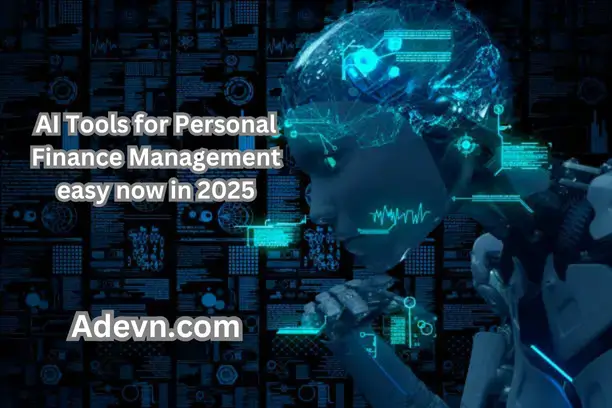AI Tools for Personal Finance Management easy now in 2025
Table of Contents
Introduction to AI in Personal Finance

AI Tools for Personal Finance
Thank you for reading this post, don't forget to subscribe!In recent years, artificial intelligence (AI) has emerged as a transformative force in the realm of personal finance management. By utilizing advanced algorithms and machine learning techniques, these AI tools effectively analyze individual financial behaviors, enabling users to make informed decisions regarding budgeting, saving, and investment strategies. Read more about : How ChatGPT Is Revolutionizing Personal Finance; As financial landscapes continue to evolve, the role of AI becomes increasingly significant, offering personalized solutions that were previously unattainable.
The importance of AI in personal finance cannot be overstated. Traditional methods of budgeting and managing finances often relied on manual calculations and static tools, which could lead to errors or outdated information. In contrast, AI-driven financial applications provide real-time insights and recommendations, empowering users to optimize their financial health efficiently. By automating tasks such as expense tracking and investment allocation, these tools not only save time but also enhance accuracy in financial management.
The growing adoption of AI tools in personal finance is evident across various demographics. Individuals ranging from young professionals to seasoned investors have recognized the value of leveraging technology to better understand their financial situations. Features such as predictive analytics, where AI forecasts future spending patterns based on historical data, enable users to create more effective financial strategies. Furthermore, chatbots powered by AI provide instant assistance and personalized financial advice.
As AI tools continue to develop, it is anticipated that their integration into personal finance will further streamline processes and enhance user experience. By harnessing the power of artificial intelligence, individuals can navigate their financial journeys with confidence, ultimately leading to more sustainable financial outcomes. The convergence of technology with personal finance signifies a remarkable shift, paving the way for smarter financial management in the future.
How AI Tools Enhance Budgeting
AI tools are reshaping the landscape of personal finance management, particularly in the area of budgeting. These sophisticated applications offer a range of features that streamline the budgeting process and offer users more control over their finances. One of the most impactful capabilities of AI budgeting tools is automated expense tracking. By linking bank accounts and credit cards, these tools can meticulously categorize expenses, enabling users to see where their money is going in real-time. This not only reduces the manual effort required but also enhances accuracy in tracking financial activities.
Another significant advantage of AI budgeting tools is their use of predictive analytics. These algorithms analyze past spending behavior to offer forecasts for future expenses, allowing users to create more accurate budgets. For instance, if a user generally spends more in particular months due to seasonal purchases, the AI can alert the user in advance, helping them prepare financially. This predictive capability fosters a proactive approach to budgeting.
In addition to tracking and prediction, AI-driven budgeting tools also provide personalized recommendations tailored to the user’s financial landscape. For example, based on spending patterns, a tool may suggest setting aside a specific amount for savings or advise on adjusting discretionary spending in certain categories. Popular tools available in 2025, such as Mint and YNAB (You Need a Budget), incorporate these advanced features that leverage AI for enhanced budgeting experiences.
Overall, the amalgamation of automated tracking, predictive analytics, and tailored recommendations signifies a leap forward in personal finance management. These AI tools not only simplify budgeting but also empower users to make informed financial choices, ultimately leading to improved fiscal health and stability.
Automated Saving with AI

The advancement of artificial intelligence (AI) has brought significant changes to personal finance management, particularly in the realm of automated savings. AI-driven saving tools are designed to analyze an individual’s spending patterns, making informed suggestions about the optimal amounts to save. By leveraging algorithms, these tools can effectively track users’ financial habits, ensuring that savings are aligned with income and expenditure while promoting prudent financial behavior.
One popular type of automated saving application is the round-up saving app. These innovative tools allow users to round up their everyday purchases to the nearest dollar, with the additional change transferred directly into a savings account. For instance, if a user spends $3.75 on a coffee, the app rounds this up to $4.00, automatically saving the $0.25. Over time, these small increments accumulate, providing a substantial savings buffer without any password fatigue on the user’s part. This method not only simplifies the savings process but also helps users to engage with their financial goals incrementally.
Moreover, the role of smart savings goals cannot be overstated. AI tools can help users set personalized saving objectives based on their financial aspirations, whether it’s building an emergency fund, saving for a vacation, or funding a home purchase. By analyzing transaction history and cash flow, these tools provide each user with recommendations tailored to their unique situations. Furthermore, they can adjust these goals in real-time, offering flexibility and responsiveness to changing financial conditions. Examples of AI-powered tools that exemplify this capability include Qapital, Digit, and Acorns, each bringing unique features and functionalities to enhance users.
In conclusion, AI-driven saving tools revolutionize the way individuals approach personal finance by automating the saving process. By analyzing spending behavior and facilitating smart savings goals, these technologies empower users to take control of their financial future with unprecedented ease.
AI-Powered Investment Platforms
The advent of artificial intelligence (AI) has fundamentally transformed personal finance management, particularly in the realm of investment management. AI-powered investment platforms, such as robo-advisors, are at the forefront of this revolution. These platforms leverage sophisticated algorithms to create and maintain diversified investment portfolios tailored to individual preferences and risk tolerances. By analyzing vast amounts of data, these tools can identify market trends and potential investment opportunities that may not be immediately apparent to human investors.
One of the most significant advantages of AI-driven investment strategies is their ability to continuously learn and adapt. Unlike traditional methods, AI algorithms can analyze historical data, real-time market movements, and even macroeconomic factors to make informed investment choices. As investors engage with these platforms, they provide information about their financial goals, risk appetite, and personal preferences. The AI operates by assessing this data, offering personalized recommendations that align with individual circumstances and long-term objectives.
Moreover, AI-powered investment platforms often include built-in risk assessment tools. These features allow users to understand their risk tolerance better, helping them to make calculated decisions about their investments. For instance, if the AI identifies a dip in a particular market segment, it can prompt users to either hold their positions or diversify into less volatile assets. This level of insight empowers individuals to make informed investment decisions with minimal effort.
As we look towards 2025, AI-driven investment platforms are likely to become increasingly sophisticated, offering deeper insights and automated features that cater to a broader audience. By democratizing access to advanced investment strategies, these technologies stand to make significant contributions to personal finance management, enabling users to optimize their investment portfolios smartly and efficiently.
Credit Score Monitoring and Improvement Tools

Monitoring one’s credit score is an essential aspect of personal finance management, as it can greatly impact loan approvals, interest rates, and overall financial health. With the rise of artificial intelligence (AI) technology, various tools have emerged that enhance the way individuals manage their credit scores. These AI-driven solutions not only provide real-time alerts but also offer personalized tips tailored to help users improve their credit ratings.
One of the significant advantages of utilizing AI tools for credit score monitoring is the capability to receive immediate notifications regarding any changes to a user’s credit report. This feature allows individuals to stay informed about fluctuations that could indicate identity theft or errors that may adversely affect their scores. Moreover, many of these tools have the ability to analyze users’ spending patterns.
Furthermore, AI tools can help identify discrepancies in credit reports that may go unnoticed by the average consumer. By employing advanced algorithms, these tools can flag potential errors, prompting users to investigate further and dispute inaccuracies directly with credit bureaus. This proactive approach not only aids in maintaining an accurate credit profile but can also lead to significant improvements in credit scores over time.
Among the recommended tools for credit score monitoring, several stand out due to their comprehensive features and user-friendly interfaces. Services like Credit Karma and Experian offer free credit score checks and monitoring, while platforms such as IdentityGuard and MyFICO provide in-depth analysis coupled with identity theft protection. Utilizing these innovative AI tools can empower individuals to take charge of their credit scores, leading to better financial decisions and improved credit profiles.
Debt Management Solutions Using AI
In today’s fast-paced financial landscape, effectively managing personal debt is critical to maintaining financial health. Leveraging artificial intelligence (AI) tools can offer innovative solutions that make this process more manageable and less stressful. Many AI-driven applications now provide users with comprehensive debt management solutions, effectively addressing the complexities of debt repayment.
One prominent feature of these tools is the debt payoff calculator, which uses algorithms to help individuals assess their current debts and determine the most efficient repayment strategies. By factoring in interest rates, payment amounts, and timeframes, users can visualize different scenarios and devise a tailored payoff plan that aligns with their financial goals. These calculators not only simplify the math involved in debt repayment but also allow users to understand the long-term impact of their payment decisions.
Additionally, personalized repayment plans created by AI can adapt to an individual’s financial situation. These plans analyze users’ income, expenditures, and other factors to suggest monthly payments that are affordable yet effective in reducing overall debt. This adaptive approach empowers users to stay on track and avoid overwhelming financial burdens.
Furthermore, AI tools can assist users in negotiating lower interest rates on their debts. Some applications utilize data analytics to benchmark users’ current rates against market conditions, providing them with insights into when and how to negotiate for better terms. This feature can significantly reduce the total cost of debt over time, saving users a substantial amount of money.
Examples of AI-based debt management tools like Tally and Undebt.it offer these features, streamlining the debt repayment process for users. By incorporating AI technologies, these applications empower individuals to manage their debts more effectively, promoting financial literacy and ultimately leading them towards a more stable financial future.
Integration of AI with Financial Advisors

The financial advisory landscape is experiencing a significant transformation, driven by the integration of artificial intelligence (AI) tools into traditional financial advisory services. As investors increasingly seek personalized and data-driven insights, financial advisors are adopting advanced AI technologies to enhance their offerings. This integration allows advisors to leverage AI’s computational capabilities to analyze complex financial data, thus augmenting the insights they provide to clients.
Moreover, AI algorithms can process vast amounts of data at unprecedented speeds. As a result, advisors can access real-time market insights, enabling them to make informed decisions swiftly. By integrating AI tools into their practices, financial advisors can also enhance the decision-making process involving asset allocation, risk management, and tax optimization strategies. AI’s ability to interpret trends and patterns within financial markets facilitates more accurate predictions.
Despite the growing reliance on AI, the role of human financial advisors remains essential. The nuances of human interaction, emotional intelligence, and personalized advice cannot be replicated by AI. As we move toward 2025, the interplay between AI and financial advisors will likely evolve into a collaborative model where AI serves as an invaluable assistant. This combined approach aims to optimize the advisory process, enhancing both efficiency and client experience.
In the future, the key challenge will be establishing a balance between human intuition and AI-driven analytics. While AI can automate routine tasks and analyze data, the empathetic understanding of clients’ needs and aspirations remains a core competency of financial advisors. The successful integration of AI into financial advisory services will not undermine the human element but rather complement it, ensuring that clients receive well-rounded financial advice tailored to their specific circumstances.
Privacy and Security Concerns in AI Tools
The increasing integration of artificial intelligence (AI) tools in personal finance management has raised significant privacy and security concerns. As these tools become more sophisticated, the potential risks to users’ sensitive financial data may also increase. One of the primary issues lies in the susceptibility of AI systems to data breaches. Cybercriminals are continually developing techniques to exploit vulnerabilities in software, and the financial sector is a lucrative target. A breach could result in unauthorized access to personal financial information, leading to fraudulent activities and identity theft.
Beyond data breaches, the misuse of personal financial information poses additional risks. AI tools often require users to input detailed financial data, which could include banking credentials, spending habits, and investment strategies. If this data is handled improperly or stored inadequately, it may be misused by third parties or inadequately protected against internal threats. Users must be aware of how their data is being used, who has access to it.
To mitigate these risks, it is crucial to choose secure AI finance applications. When evaluating AI tools for personal finance, users should look for applications that implement strong encryption methods, robust authentication processes, and transparent privacy policies. Additionally, reading user reviews and assessing the application’s compliance with data protection regulations can provide insight into its reliability. As AI technology continues to evolve, remaining vigilant about privacy and security will be paramount for users aiming to protect their sensitive financial information while reaping the benefits of these innovative tools. This approach will enhance trust in AI tools while ensuring financial data remains secure.
Conclusion: The Future of Personal Finance with AI

The landscape of personal finance management is undergoing a significant transformation, largely propelled by advancements in artificial intelligence (AI). As we approach 2025, the integration of AI into financial tools is anticipated to reshape how individuals manage their finances, offering enhanced efficiency, clarity, and control. AI-powered applications are designed to analyze spending patterns, provide real-time budgeting insights, and deliver personalized financial advice, thus making financial literacy more accessible than ever before.
In the coming years, we can expect a greater emphasis on automation within personal finance. AI tools; AI will play a vital role in automating routine financial tasks such as bill payments and savings allocations. AI tools; This transformation will allow individuals to focus more on their broader financial goals, rather than getting bogged down by day-to-day management. AI tools; Moreover, predictive AI capabilities will provide users with actionable insights, alerting them to potential financial pitfalls and presenting tailored strategies to mitigate risks effectively.
Furthermore, the adaptability of AI tools will serve a diverse demographic, catering to varying levels of financial knowledge and backgrounds. AI tools; Whether it is through chatbots that answer financial queries or sophisticated algorithms that tailor investment strategies, the goal remains consistent: to empower users by simplifying complex financial concepts and making informed decision-making more achievable. AI tools; As these AI tools evolve, they will facilitate a stronger understanding of personal finance and build confidence among users in navigating their financial futures.
As we look forward, it is crucial for consumers to stay abreast of these technological advancements, embrace the evolving tools, and recognize the immense potential AI holds in enhancing their personal finance journey. AI tools; The future of personal finance management is bright, and by leveraging AI.
ai accounting budget automation budgeting strategies business plan credit cards credit scores cryptocurrency analysis crypto investment crypto staking crypto taxes debt consolidation debt management economic outlook esg stocks executive retirement finance courses finance management fintech app fintech education income streams invest gold lending platforms make money online jobs personal finance personal loans real estate retirement planning retirement plans savings accounts seo optimization stock market tax minimizers tax strategies workspace business
AI Tools for Personal Finance Management easy now in 2025
In recent years, artificial intelligence (AI) has emerged as a transformative force in the realm of personal finance management. By utilizing advanced algorithms and machine learning techniques, these AI tools effectively analyze individual financial behaviors, enabling users to make informed decisions regarding budgeting, saving, and investment strategies. Read more about : How ChatGPT Is Revolutionizing Personal Finance; As financial landscapes continue to evolve, the role of AI becomes increasingly significant, offering personalized solutions that were previously unattainable.

